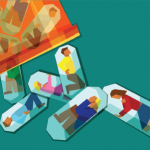 ACR Convergence 2020—In a desperate state last spring, the wife of a patient with myositis called social workers at the Hospital for Special Surgery, New York. Due to the COVID-19 pandemic, she had decided not to allow a home health aide—or anyone else—into the house to help care for her husband. She was tearful, overwhelmed and in emotional distress, said Adena Batterman, MSW, senior manager of the Inflammatory Arthritis Support and Education Programs, during an ACR Convergence 2020 session.
ACR Convergence 2020—In a desperate state last spring, the wife of a patient with myositis called social workers at the Hospital for Special Surgery, New York. Due to the COVID-19 pandemic, she had decided not to allow a home health aide—or anyone else—into the house to help care for her husband. She was tearful, overwhelmed and in emotional distress, said Adena Batterman, MSW, senior manager of the Inflammatory Arthritis Support and Education Programs, during an ACR Convergence 2020 session.
Held on Nov. 9, 2020, the session addressed the pandemic’s heavy psychosocial toll on those who contract COVID-19, patients with rheumatic diseases who are worried that their illness and immunosuppressive treatments place them at a higher risk for complications and caregivers for those with chronic illness. All of these issues require healthcare professionals to remain extra vigilant for signs of mental health issues and other psychosocial needs of patients, according to Ms. Batterman.
Research found depression has increased threefold since the start of the pandemic, and 40% of people have struggled with mental health or suicidality during the pandemic.1
Further a survey conducted from June 24–30 found that in the previous month, 10.7% of the respondents had seriously considered suicide.2 Reasons included the isolation stemming from stay-at-home guidelines, the increased stresses of daily life and concerns of already medically vulnerable people about becoming infected.
Ethnic minorities, the poor, those in dense housing areas and essential workers are among those who are particularly vulnerable to these psychosocial issues, Ms. Batterman reported.
All clinicians, she noted, should have a keen eye open for those who need to be referred to special resources, especially because medical encounters are down and fewer opportunities exist to direct people to needed care. Support groups, faith-based organizations, mental health support via telehealth, virtual Alcoholics Anonymous meetings to support sobriety and virtual exercise and mindfulness programs are available to help people experiencing extreme psychological distress and psychosocial issues. Although not a substitute for the services typically available, for some, these can be a valuable lifeline and resource for support and coping, Ms. Batterman said.
Healthcare professionals also need to remember to take care of themselves. “We are healthcare providers, and we are healers. This is challenging work emotionally and physically—even before COVID-19, but of paramount importance right now,” Ms. Batterman said. “I think we need to acknowledge this [fact] and allow this [experience] to be a reminder to practice self-compassion.”




